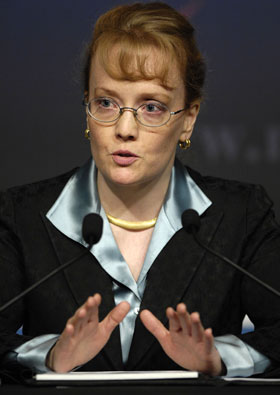This follows the case of Lisa Novak, who wanted to eliminate the girlfriend of her astronaut lover and the revelation of astronauts who got drunk * Space experts - again the warnings did not reach as high as in the Columbia disaster

In the photo: Shana Dale at the press conference on Friday, 27/7/07
A NASA medical team revealed on Friday that at least twice, astronauts were cleared to board a flight despite warnings from the flight doctors and other astronauts about their alcohol addiction. One drunken astronaut even flew a Soyuz spacecraft on a mission to the International Space Station, the other was approved for the flight, but it was delayed due to mechanical problems with the shuttle, but he later tried to take off in a jet plane used for training while under the influence of alcohol. The Russian space agency denied on Saturday that an astronaut is even allowed to fly drunk aboard a Soyuz spacecraft from the Baikonur cosmodrome.
NASA Deputy Administrator Shana Dale said that the agency is promoting the implementation of many of the recommendations in the studies published this weekend regarding the evaluation of the health status and behavior of the astronauts. The two reviews are published five months after the agency appointed an independent investigative committee to analyze the state of health care available to astronauts. Both studies began following the imprisonment in February of former astronaut Lisa Novak.
Dale listed four areas to focus on:
• NASA Safety Director Brian O'Connor, a former astronaut, began a massive investigation last Friday focusing on allegations of illegal alcohol use. O'Connor will review existing policies related to alcohol use and pre-flight astronaut medical eligibility. The goal is to ensure that the risks to flight safety are addressed before the appropriate authorities, and if necessary, will be raised with full transparency to senior management for review and decision-making.
• NASA's medical policy-making committee, which includes internal and external space experts, will evaluate the findings related to medical matters and the astronauts' behavior as reflected in the two reports. The committee will add the examination of the behavior and functioning of the astronauts' organization as part of the annual medical examinations conducted for all astronauts.
• The agency will develop a code of conduct for astronauts and has asked its astronauts to help develop the formal guidelines. The astronauts have already begun to develop an initial set of recommendations and agency management will build a process in collaboration with them to create an official code.
• To address issues related to corporate culture, highlighted in the reports, NASA will begin a series of internal assessments, including anonymous reports to be filled out by the astronauts and the people who work with them in flight preparations, to provide feedback and gather information. The goal is to improve communication and ensure that management is sensitive to concerns and complaints.
"We are making rapid progress regarding the recommendations. NASA Administrator Mike Griffin and myself are closely monitoring the progress of the process," Dale added. "After completing the reviews, we intend to share the findings with the public to the maximum extent possible."
The first review is an internal report containing the first assessment of the medical procedures designed to test the behavior of the astronauts, also published a few days earlier in Houston. The second document - a more comprehensive review by external experts was called the "Astronaut Health System Review Committee" appointed by NASA's Medical Director Dr. Richard Williams. The committee was headed by Colonel Richard Bachman, commander of the US Air Force's School of Aviation Medicine. It completed an important task on short notice and I thank the members of the committee for the time they devoted to the important review." Dale said. "We are committed to improving the behavioral treatment and evaluation procedures of the astronauts. "I believe that the adjustments and changes that will come as a result will be good for the astronaut corps and NASA as a whole.
Commentary: a symptom of not listening to juniors
Several commentators have written that the problem of NASA's corporate culture has not been resolved, despite all the procedures that came into effect following the Columbia disaster, which was caused by negligence and disdain that were part of the corporate culture. Again the problem is the culture - the habit of not listening to the knowledge held by juniors in the organization. Four years ago, it was ignoring engineers who feared disaster for the Columbia shuttle and in the end it turned out they were right. This time it's the NASA doctors and fellow astronauts who didn't listen to them when they tried to warn that some astronauts drank too much alcohol before the flight. "I believe that things have changed, but there are things that haven't changed," says Douglas Oshroff, a Nobel laureate in physics who participated in the investigation of the Columbia disaster in 2003.
